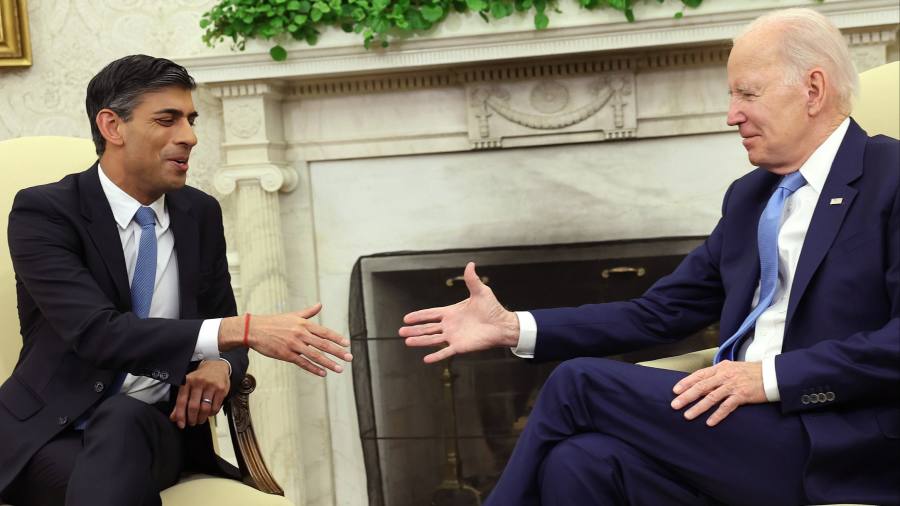US president Joe Biden and UK prime minister Rishi Sunak on Thursday agreed an “Atlantic declaration” to strengthen economic ties between the two countries, in a further sign of the allies turning their back on globalisation and trying to cut China out of key supply chains.
The declaration aims to increase US-UK trade in areas such as defence, nuclear materials and the critical minerals used in electric car batteries, as part of an attempt by Biden to build “economic security” among western allies.
Sunak, speaking in the Oval Office, said the world stood on the brink of the biggest technological change since the industrial revolution, but that this also gave adversaries “more tools to harm” western democracies.
Biden, who apologised for accidentally calling Sunak “Mr President”, made allusions to the wartime relationship of Roosevelt and Churchill. But British officials said the Atlantic declaration was an unsentimental attempt to forge a forward-looking US-UK relationship based on economic security.
The agreement comes after hopes of a full-blown US-UK free trade deal — a dream of Eurosceptic Conservatives in Britain — were dashed.
The declaration is a recognition by Sunak, a free-marketeer and opponent of state subsidies, that he must work with a Biden administration which is using industrial policy and tax breaks to promote green technology.
It seeks to secure special US deals for the UK similar to ones being negotiated by other allies such as Japan, Australia and the EU, to build up new supply chains that reduce reliance on China.
British manufacturers of electric cars using UK-made batteries — or products sourced from countries like Japan with whom the US has a deal on critical minerals — will qualify for tax credits of $3,750 per vehicle under Biden’s Inflation Reduction Act, his flagship legislation promoting green technology.
Biden has meanwhile committed to ask Congress to approve the UK as a “domestic source” under US defence procurement laws, which British officials claimed will allow speedier and more effective co-operation on new military technology.
The declaration also targets other niche deals, including a “data bridge” to cut red tape for small exporting companies.
The agreement includes a push for mutual recognition of qualifications for engineers and later accountants, although this could require state-by-state approval in the US.
Sunak confirmed Britain would host the first global summit on artificial intelligence regulation in the autumn, saying the UK can provide leadership on developing new rules to mitigate risks posed by the technology.
He said people had questioned what sort of partner Britain would be after Brexit, adding: “Judge us by our actions.”
Sunak said the UK remained an attractive investment destination and that Britain could now move “more swiftly and flexibly” to create new rules for emerging technology like AI.
There were some effusive words between the two leaders. Biden said that “no country is closer to us than the United Kingdom”, while Sunak spoke about the “indispensable alliance”.
But British diplomats admitted some clouds hung over the relationship, mirrored by the haze caused by Canadian wild fires that hung over the US capital during Sunak’s visit.
On the positive side, the US and the UK have worked closely on Ukraine and on developing a military partnership — alongside Australia — to develop nuclear-powered submarines to counter China in the Pacific.
Sunak also helped to gain Biden’s trust by resolving the post-Brexit row over Northern Ireland’s trading arrangements, although the US president said in May he had to travel to Ireland to “make sure the Brits didn’t screw around”.
“I’m lucky to enjoy a good relationship with President Biden,” Sunak told reporters, while shying away from repeating the hackneyed old British claim to enjoy a “special relationship” with the US.
But Biden was a critic of Brexit, and Democrats cannot understand why Sunak — who backed the UK leaving the EU — restricted the country’s influence in its own continent.
Nor do Biden and the free-market Sunak see eye-to-eye on the US president’s policy of state subsidies to promote green technology. The UK Labour opposition, by contrast, is wholly signed up to the idea.
Both are facing an electoral rendezvous with the voters in 2024 — possibly fighting concurrent election campaigns next autumn — adding to a list of challenges bringing the two leaders closer together.
Read the full article here




